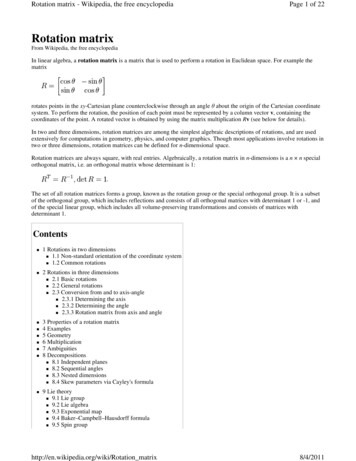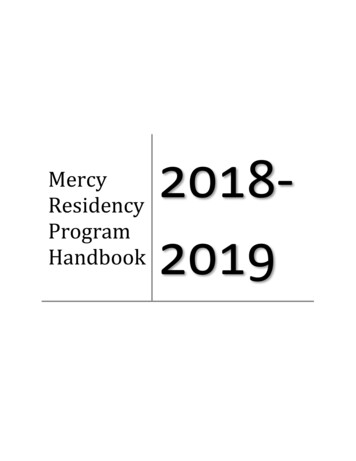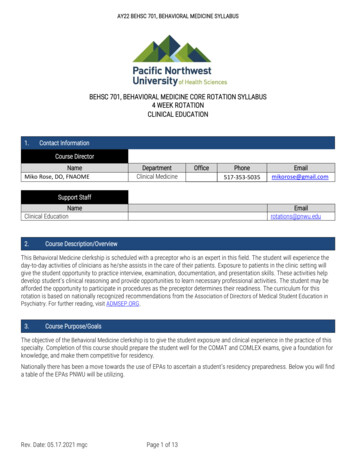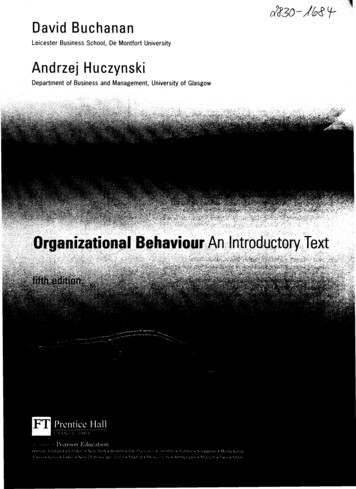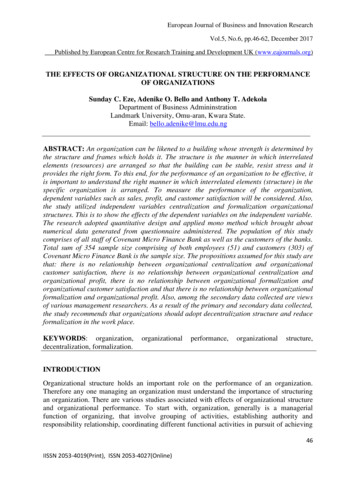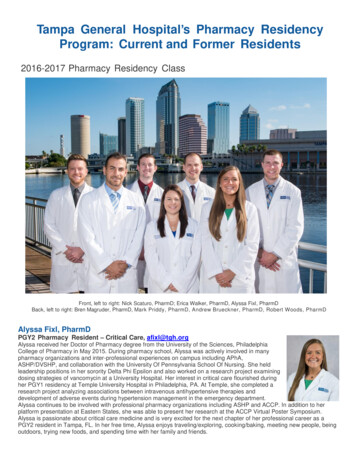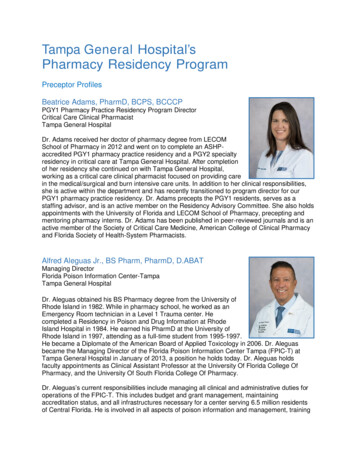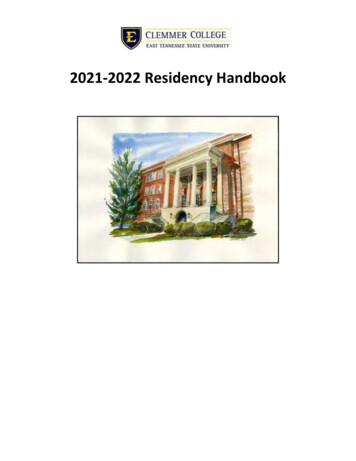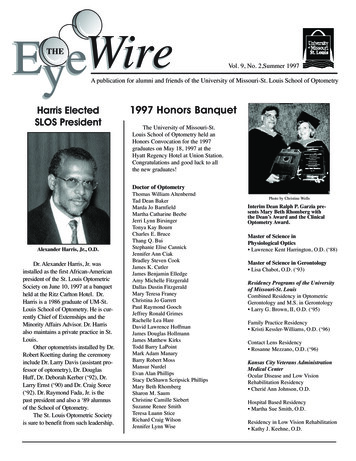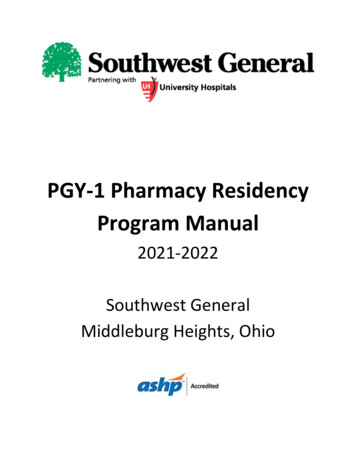
Transcription
PGY2 Psychiatric Pharmacy ResidencyResidency Structure 2021-2022Residency Structure and Rotation DescriptionsThis document is a brief description of each of the learning experiences offered within the PGY2 Psychiatric Pharmacy Residency. All rotationsare subject to change. Availability may change based on availability of preceptors, changes in the learning environment or residents customizedneeds.Rotation NameLongitudinal / Concentrated Required /ElectiveLength (weeks)Patient care?Professional oDrug InformationLongReq52noPatient Education GroupsLongReq40yesContinuity ClinicLongReq36yesInpatient Psychiatry IConcReq4-6yesInpatient Psychiatry IIConcReq4-6yesOutpatient Psychiatry IConcReq4-6yesOutpatient Psychiatry IIConcReq4-6yesCBOC Psychiatric ncReq4-6yesEmergency DepartmentConcReq4-6yesElective Rotation Offerings, in addition to repeating required rotations. Residents will complete 3 concentrated electivesCLCConcElect 34-6yesNeurologyConcElect 34-6yesResidency DevelopmentConcElect 34-6noPCMHIConcElect 34-6yesMHICMConcElect 34-6yesPharmacy LeadershipConcElect 34-6noRepeat ExperienceConcElect 34-6yes
PGY2 Psychiatric Pharmacy ResidencyRotation NameProfessional OutreachProjectMUEDrug InformationPatient Education GroupsContinuity ClinicInpatient Psychiatry IInpatient Psychiatry IIOutpatient Psychiatry IOutpatient Psychiatry IICBOC Psychiatric PharmacyResidency Structure 2021-2022Rotation DescriptionThis learning experience focuses on activities that contribute to professionaldevelopment in areas other than patient care.The resident will use the scientific process, data and evidence to conduct qualityimprovement or research project and develop skills in critical evaluation of themedication use system.The resident will design and conduct an MUE to critically evaluate themedication use system. Proposed changes will be presented in a final report tothe P&T committee.There are several activities throughout the year that involve delivery of druginformation to a variety of audiences.Resident will design and deliver education to patients in a group setting. Thisallows practice in delivering patient centered education as well as allows for abetter understanding of the patient perspective.This longitudinal experience focuses on opportunities to provide care to patientson an on-going basis.The resident will engage in the daily workflow and be responsible for patientcare activities for acutely mentally ill patients on the inpatient psychiatry unit.Residents will actively participate in the treatment team and coordinate carethroughout patient stay and gain familiarity with the VA systems, policies andprocedures.Building on Inpatient I, increasing responsibility and independence the residentwill additionally focus on geriatric patients to gain experience with cognitive andneurologic disorders. Precepting is generally available during this rotation.Residents will provide patient care in the outpatient mental health clinic for bothscheduled and walk-in appointments. The resident will work withinterdisciplinary teams to coordinate and optimize care.Resident will build on the skills and knowledge gained in other rotations andincrease their level of responsibility and independence while providing care topatients in the walk-in clinic and scheduled appointments.The busy community clinic in the outlying community or rural area allowsexperience with a pharmacist that has an independent patient care practice andserves as a drug information resource to the other providers in the clinic.Rotation ActivitiesOrientation, Committeeinvolvement, Portfoliodevelopment, VA ADERSProjectMUE1 CE presentation, 2 Casepresentations, MH CPS topicdiscussionsweekly for 5 months in theyear (alternating monthswith second resident)Patient care activities everyother weekDaily treatment teammeetings, journal club, topicdiscussionsDaily treatment teammeetings, journal club/inservice, topic discussionsPatient care activities, Druginformation, topicdiscussionsPatient care activities, Druginformation, journal club,topic discussionsPatient care activities,journal club/In-service, topicdiscussions
PGY2 Psychiatric Pharmacy ResidencySARRTP/SACPainEmergency DepartmentElective rotationsCLCNeurologyResidency Structure 2021-2022The resident will provide direct patient care and education to the residents of aSubstance Abuse Residential Rehabilitation Treatment Program (SARRTP) andoutpatient Substance Abuse Clinic (SAC). The resident will work closely with theinterdisciplinary team to coordinate and optimize care.While working with the chronic pain and wellness center, the resident willprovide and coordinate care in a multidisciplinary team to improve the safetyand well-being of patients with chronic pain. *This rotation will be later in theresidency year as more independence is required for successful completionThere are many opportunities in the Emergency Department to provide directpatient care and clinical pharmacy support to psychiatric patients. The residentwill work with the emergency department team to optimize care to psychiatricpatients in that setting.The Community Living Center (CLC) provides care to patients requiringrehabilitation or hospice and palliative services on a long-term basis. Thepatients often have neurologic and psychiatric considerations that the residentmay not experience in other settings.The resident will work independently with the neurology team in a variety ofclinics. Headache, movement disorders, seizure, stroke rehabilitation and awhole lot more opportunities are available in this rotation. *Resident will needto demonstrate autonomy and independence before going on this rotation.MHICMResidents will gain an understanding of residency structure and design will havethe opportunity to work with the program on quality improvement activities.Residents will work with the providers in Primary Care Mental Health Integration(PCMHI), to provide support and care to psychiatric patients within the primarycare setting.***Rotation availability subject to having a suitable preceptor availableMental Health Intensive Care Monitoring (MHICM) program provides care toseriously mentally ill patients. Resident will work with team to determinepatients in need of care and may do so through telephone, video, face to face orhome visits. Resident will coordinate care through the mental health andprimary care teams. *The resident will require a high level of independence forthis rotationPharmacy LeadershipThis rotation is intended for residents that would like more exposure tomanagement and practice leadership opportunities.Residency DevelopmentPCMHI***Patient care activities, 30day chart reviews, topicdiscussions, journal club/inservicePatient care activities, Druginformation, TopicdiscussionsPatient care activities, Druginformation, topicdiscussionsPatient care activitiesTopic discussionsQuality ImprovementActivities, meetings withstake holdersPatient care activities, Topicdiscussions, In-servicePatient care activities, Inservice presentations, topicdiscussionsPharmacy practice andmanagement relatedactivities to be determined
PGY2 Psychiatric Pharmacy ResidencyResidency Structure 2021-2022General Residency ScheduleIndividual Resident schedules may differ depending on availability of preceptors and scheduling concerns, however a sample schedule isprovided as an example.Sample Residency ScheduleLongitudinal RotationsProfessional OutreachOri enta ti onProjects el ect projectMUESel ect MUEDrug Information*Qua rter 1Project propos a lMUE Propos a lP&T commi ttee*CPS topi c CE #1Continuity Clinic**Qua rter 2*Qua rter 3Project i ni ti a ti on, Da ta col l ecti on, Proces s i ngDa ta col l ecti on a nd Proces s i ngP&T Fi na l ReportCa s e Pres enta ti on *CPS*Patient Education Groups**Res i dent 1**Res i dent 2*CPS**Yea r endCPNP Pres enta ti on Fi na l pres enti on a nd ma nus cri pt*Res i dent 1*CE #2*Res i dent 2**CPS*Res i dent 1*Ca s e Pres enta ti on*Res i dent 2**CPS*Res i dent 1**Res i dent 2**Res i dent 1**Res i dent 2Concentrated rotationsResident #1Ori enta ti on Inpa ti ent ISARRTP/SACOutpa ti ent ICBOCEl ecti vePa i nOutpa ti ent IIEmergencyInpa ti ent IIEl ecti veEl ecti veResident #2Ori enta ti on SARRTP/SACInpa ti ent ICBOCPa i nOutpa ti ent IEmergencyEl ecti veOutpa ti ent IIEl ecti veInpa ti ent IIEl ecti ve
PGY2 Psychiatric Pharmacy ResidencyResidency Structure 2021-2022Required Disease State CompetenciesElective: MHICMElective: PCMHIElective: ResidencyDevelopmentElective: NeurologyElective: CLCCBOCEmergency PsychPainSARRTPxxOutpt Psych 2Inpt Psych 2xxOutpt Psych 1Inpt Psych 1ContinuityThe required goals and objectives for PGY2 Psychiatric Pharmacy Residencies include several disease states with which the resident should gainfamiliarity and expertise. Ultimately the resident should feel comfortable managing the first section of topics and should gain familiarity with thetopics listed in the bottom section through topic discussions or assigned readings.Required Topic discussions / Areas of expertise Schizophrenia and other psychotic disorders Bipolar Disorder Major Depressive Disorder Anxiety disorders (GAD, Panic, OCD, SAD, PTSD) Psychoactive substance-use disorders (including information on routesof administration of psychoactive substances and common street names) Dual diagnosis Personality disordersxxxxxxxxxxxxxxxxxx(The following required areas may be accomplished through didactic discussion, reading assignments, case presentations, written assignments, and/or direct patient care experiences.) Sleep disorders Eating disordersx Geriatric psychiatry (acute, ambulatory, or long-term care) Psychiatric disorders in children and adolescentsxxx Neurological disorders (e.g., pain, movement, seizures, headache,dementia, traumatic brain injury, autoimmune disorders) Developmental disorders (e.g., autism spectrum disorder, Downsyndrome, Wilson’s, Prader-Willie Syndrome) Syndromes associated with aggression, hostility, or agitation Delirium Pregnancy and postpartum psychiatric disordersxxxxxxxxxxxxxxxxxx
PGY2 Psychiatric Pharmacy ResidencyResidency Structure 2021-2022Activities for Required Disease state competenciesThe resident will explain signs and symptoms, epidemiology, risk factors, pathogenesis, natural history of disease, pathophysiology, clinical course, etiology, andtreatment of diseases and conditions listed below.The resident will also have experience managing patients with these diseases and conditions.The resident will explain the mechanism of action, pharmacokinetics, pharmacodynamics, pharmacogenomics, pharmacoeconomics, usual regimen (dose,schedule, form, route, and method of administration), indications, contraindications, interactions, adverse reactions, and therapeutics of medications and nontraditional therapies, where relevant, that are applicable to the diseases and conditions listed below.The resident will explain various forms of non-medication therapy, including life-style modification and the use of devices for disease prevention and treatment,for diseases and conditions listed below.(Remembering) Expertise Participate in a learning activity such as a topic discussion, reading assignment, case presentation, written assignment or patient careexperience.Explain the signs and symptoms, epidemiology, risk factors, pathogenesis, natural history of disease, pathophysiology, clinical course,etiology, and treatment of the disease.Identify usual regimen (dose, schedule, form, route, and method of administration), indications, contraindications, interactions, adversereactions, and therapeutics of medications and non-traditional therapies, where relevant, that are applicable to the diseaseExplain the mechanism of action, pharmacokinetics, pharmacodynamics, pharmacogenomics, pharmacoeconomics of medicationregimens considered.(Applying) Experience Develop appropriate and complete care plans for patients with the disease.(Remembering) Exposure Participate in a learning activity such as a topic discussion, reading assignment, case presentation, written assignment or patient careexperience.
SARRTP/SAC The resident will provide direct patient care and education to the residents of a Substance Abuse Residential Rehabilitation Treatment Program (SARRTP) and outpatient Substance Abuse Clinic (SAC). The resident will work closely with the interdisciplinary team to coordinate and optimize care. Patient care activities, 30-
